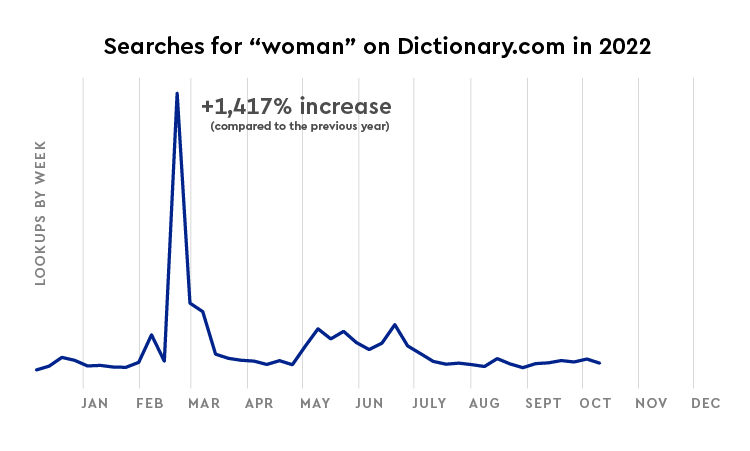What words epitomized 2022?
Earlier this month, the attendees at the American Dialect Society selected –ussy as the Word of the Year for 2022. It’s a word part, a suffix, that according to linguist Ben Zimmer, who emcees the Word of the Year event, “snowballed as a playful way of extending a somewhat taboo concept in all sorts of unforeseen directions — especially among the LGBTQ+ community, where this kind of racy wordplay is often prized.” It seems to have begun with the blend “bussy,” a combination of “boy” and “pussy” to refer to an orifice. The usage got extended to things like pizzussy, bairstussy, winussy, and SCOTUSSY.
-ussy seemed a bit too ironic and TIKTOKy for me. I was pulling for rizz meaning “effortless attractiveness or style.” It a clipping of “charisma.”
The ADS has been selecting a Word of the Year since 1990, when it was a promotional idea developed y by the late Allan Metcalf. It was a fitting complement to the Society’s long-running Among the New Words featuring in American speech and the first WOTY was bushlips, for “insincere political rhetoric.” You can find a complete list here.
The ADS event is always a raucous one, with a slate of candidates in different categories—MOST LIKELY TO SUCCEED, POLITICAL WORD OF THE YEAR, DIGITAL WORD OF THE YEAR, INFORMAL WORD OF THE YEAR, EUPHEMISM OF THE YEAR, and more. People speak in support or against the contenders, and offer up linguistic, cultural, or personal reasons for this or that choice.
 The American Dialect Society is not the only word of the year around.
The American Dialect Society is not the only word of the year around.
All the major dictionaries select one. The Oxford English Dictionary’s was decided by a public vote this year, rather than by lexicographers. Over 340,000 people voted and goblin mode won in a landslide. That’s behavior that is “unapologetically self-indulgent.”
It’s an aging Twitterism that got news legs in 2022.
The Merriam-Webster dictionary makes its pick based on the word that shows the biggest rise in lookups in a year. The winner gaslighting, defined as “the act or practice of grossly misleading someone especially for one’s own advantage.”
It showed a 1,740% rise in searches for the term in 2022.
Dictionary.com also chooses their word of the year based on look ups. The winner: woman. It’s not a new word by any stretch of the imagination, but it showed a 1,400% spike in searches. Why, you ask? Discussions of transgender rights prompted people to see what the dictionary says a woman is.
 You can look it up here.
You can look it up here.
The venerable British Collins Dictionary selected permacrisis (“an extended period of instability and insecurity”) as it choice. From Brexit to COVID to Ukraine to the monarchy, revolving prime ministers, climate extremes, and the cost-of-living, permacrisis captures the moment and more. Collins chooses its word of the year from a short list selected by monitoring its eight billion-word Collins Corpus database of words, along with other sources. The other nine were Carolean (“Of or relating to Charles III”), Kyiv, lawfare, partygate, quiet quitting, splooting, sportswashing, vibe shift, and warm bank.
Cambridge Dictionary selected homer as its word of the year. Not the Simpson patriarch but the Wordle solution on May 5th
According to Cambridge, homer was looked up 75,000 times on the Cambridge Dictionary website during the first week of May, mostly from outside of North America.
Lynne Murphy is an American who has been living in the English for a number of years and the author of The Prodigal Tongue. Her Separated by a Common Tongue blog picks words of the year that have travelled from the UK to the US and vice versa. The UK-to-US word was fit, a bit of UK slang meaning “sexy.” . Her US-to-UK words for 2022 was also homer. She called it “possibly the most talked-about Americanism in British social media this year.”
Mignon Fogarty, a.k.a. Grammar Girl, put her word-of-the-year to a series of elimination votes on LinkedIn, asking followers to vote on the word that captured the 2022 zeitgeist. The eventual winner, inflation, beating out quiet quitting, slava Ukraini, democracy, polarized, long COVID and 58 other contenders.
The list could go on and on. The National Council of Teachers of English makes a Doublespeak Award of words and phrases designed to mislead and deceive (in 2022 it was China Virus). Lake Superior State University puts out a hit list of words that should be banished and their snarkussy 2023 list is GOAT, inflection point, quiet quitting, gaslighting, moving forward, amazing, Does that make sense?, irregardless, absolutely and It is what it is.
And this just in: the American Name Society has made its picks. Their Names of the Year: Ukraine.
The words we choose are more than just a curiousity, as Valerie Fridland reminds us. They tell us about who we are, what we know and don’t know, and what captures our attention, event for a moment.
It’s not too soon to be thinking about the word of the year for 2023. Throughout the year, I’ll try to list some contenders, but I’ll probably get them wrong. After all, I voted for rizz.
My January picks: extraordinary measures, from Janet Yellen and bunny boiler from Senator John Kennedy (referring to George Santos).
February: balloonacy
Check back for updates.

 Follow
Follow